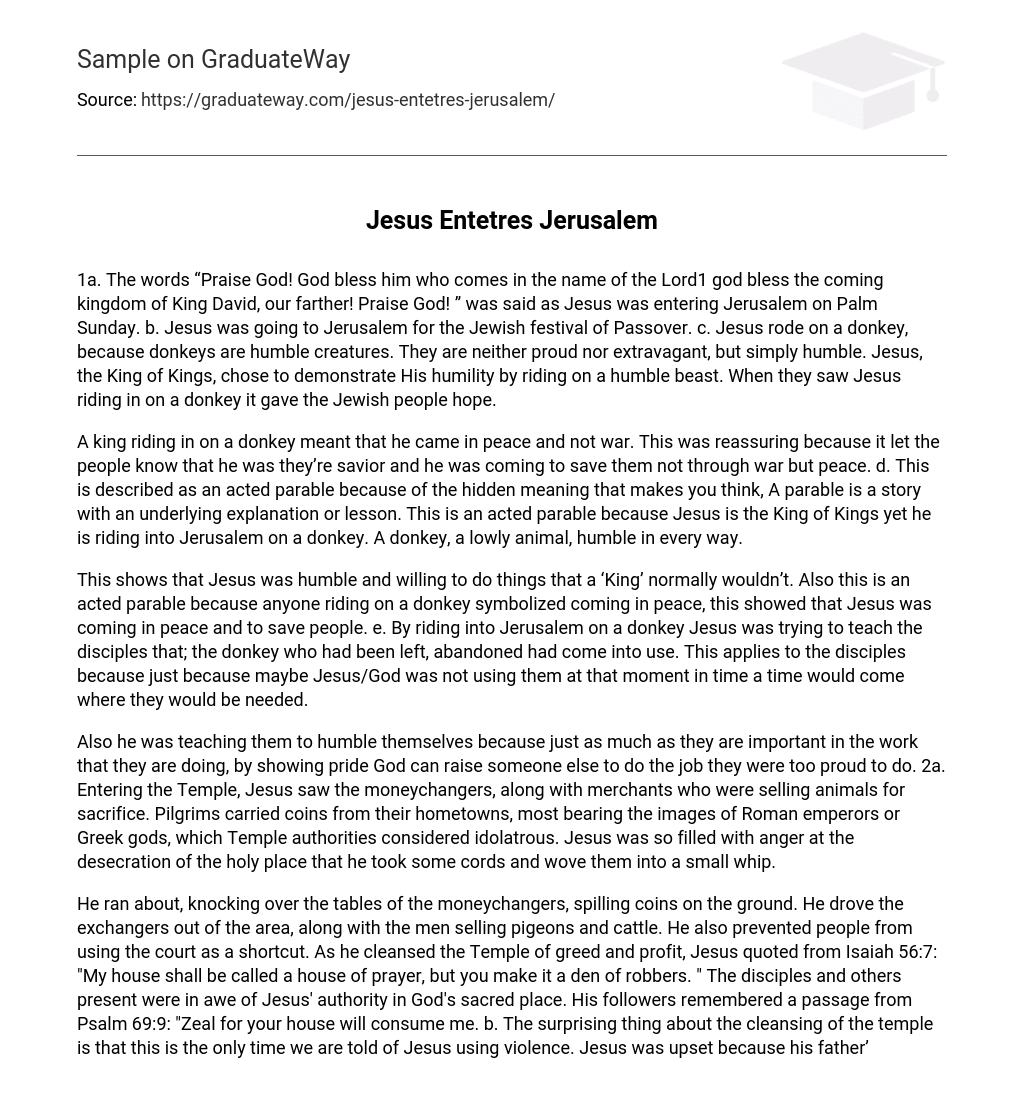1a. The words “Praise God! God bless him who comes in the name of the Lord1 god bless the coming kingdom of King David, our farther! Praise God! ” was said as Jesus was entering Jerusalem on Palm Sunday. b. Jesus was going to Jerusalem for the Jewish festival of Passover. c. Jesus rode on a donkey, because donkeys are humble creatures. They are neither proud nor extravagant, but simply humble. Jesus, the King of Kings, chose to demonstrate His humility by riding on a humble beast. When they saw Jesus riding in on a donkey it gave the Jewish people hope.
A king riding in on a donkey meant that he came in peace and not war. This was reassuring because it let the people know that he was they’re savior and he was coming to save them not through war but peace. d. This is described as an acted parable because of the hidden meaning that makes you think, A parable is a story with an underlying explanation or lesson. This is an acted parable because Jesus is the King of Kings yet he is riding into Jerusalem on a donkey. A donkey, a lowly animal, humble in every way.
This shows that Jesus was humble and willing to do things that a ‘King’ normally wouldn’t. Also this is an acted parable because anyone riding on a donkey symbolized coming in peace, this showed that Jesus was coming in peace and to save people. e. By riding into Jerusalem on a donkey Jesus was trying to teach the disciples that; the donkey who had been left, abandoned had come into use. This applies to the disciples because just because maybe Jesus/God was not using them at that moment in time a time would come where they would be needed.
Also he was teaching them to humble themselves because just as much as they are important in the work that they are doing, by showing pride God can raise someone else to do the job they were too proud to do. 2a. Entering the Temple, Jesus saw the moneychangers, along with merchants who were selling animals for sacrifice. Pilgrims carried coins from their hometowns, most bearing the images of Roman emperors or Greek gods, which Temple authorities considered idolatrous. Jesus was so filled with anger at the desecration of the holy place that he took some cords and wove them into a small whip.
He ran about, knocking over the tables of the moneychangers, spilling coins on the ground. He drove the exchangers out of the area, along with the men selling pigeons and cattle. He also prevented people from using the court as a shortcut. As he cleansed the Temple of greed and profit, Jesus quoted from Isaiah 56:7: “My house shall be called a house of prayer, but you make it a den of robbers. ” The disciples and others present were in awe of Jesus’ authority in God’s sacred place. His followers remembered a passage from Psalm 69:9: “Zeal for your house will consume me. b. The surprising thing about the cleansing of the temple is that this is the only time we are told of Jesus using violence. Jesus was upset because his father’s house, the holy temple, was being used for worldly things. Jesus was so angry he decided to take a stand and command and chase people out of the temple. Cleansing it whilst doing so. Jesus had to cleanse the temple because he was about to die and if he did not do this, people would continue to misuse the temple and be deceived.





